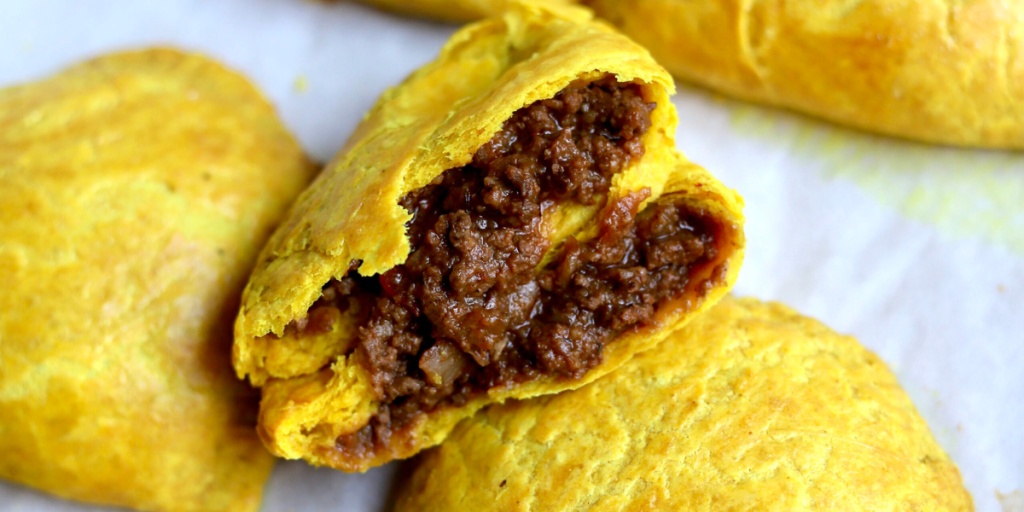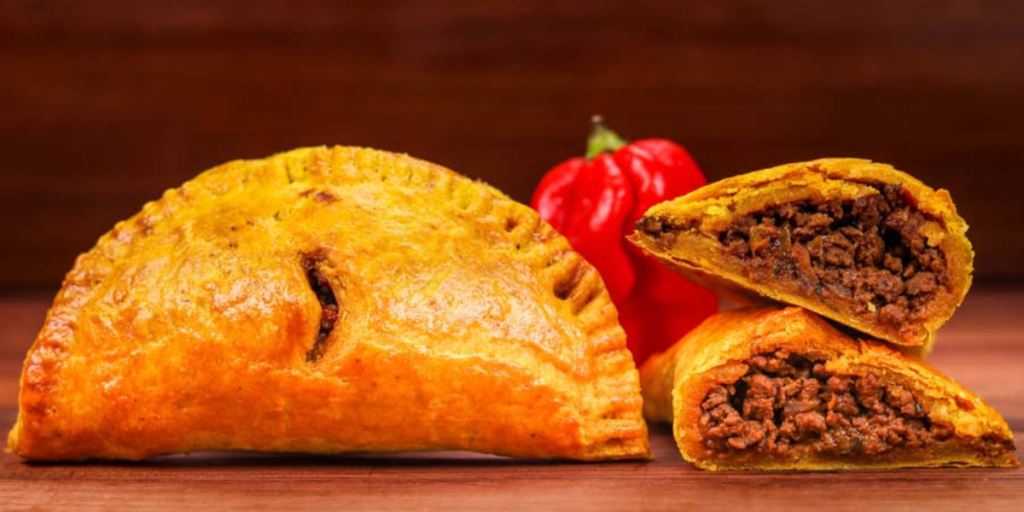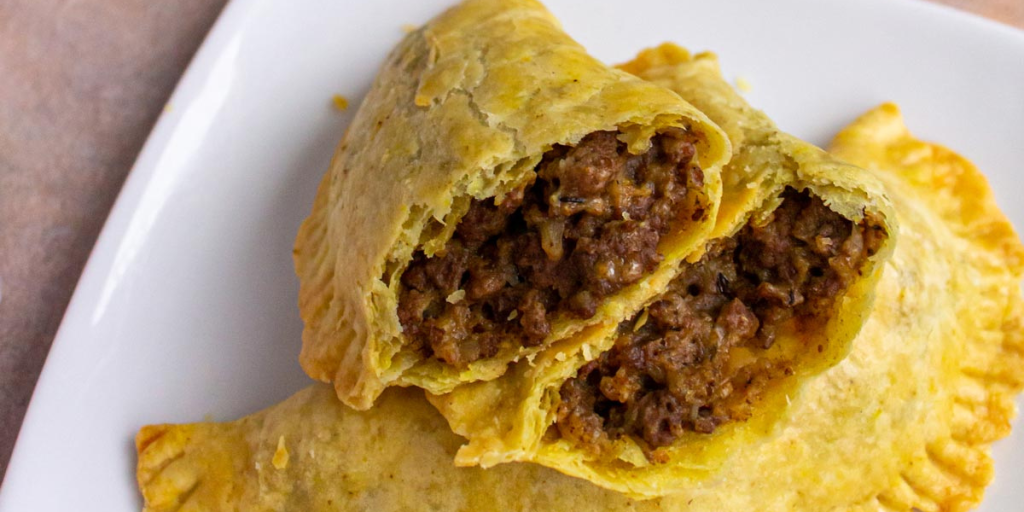Table of Contents
Jamaican patties are a beloved snack around the world, known for their golden, flaky crust and flavorful fillings. Originating in Jamaica, these hand-sized pastries have crossed borders, becoming a global favorite. But as delicious as they are, many people wonder, are Jamaican patties healthy?
This article aims to explore the nutritional aspects of Jamaican patties, providing a comprehensive guide that will help you make informed choices. We’ll examine the ingredients, calorie content, health benefits, and potential concerns related to consuming Jamaican patties. We’ll also suggest ways to make this iconic dish healthier without sacrificing flavor.
Best Nigerian Party Jollof Rice Recipe | 2024
A Closer Look at Jamaican Patties

What Are Jamaican Patties?
At their core, Jamaican patties are a pastry filled with savory ingredients, most commonly ground beef seasoned with a blend of spices. The crust, often made with a combination of flour, butter or shortening, and turmeric, gives the patty its distinctive color and flakiness.
While the traditional version contains beef, there are several other varieties, including chicken, seafood, and vegetarian options. The filling is cooked with ingredients like onions, garlic, and peppers, and seasoned with thyme, allspice, and scotch bonnet peppers for a burst of Caribbean flavor.
Nutritional Overview
Before diving into whether Jamaican patties are healthy, let’s first take a look at the typical nutritional profile of one standard beef patty:
- Calories: Approximately 300-400 calories per patty
- Fat: 20-25 grams (saturated fat comprises a significant portion)
- Protein: 8-12 grams
- Carbohydrates: 30-35 grams
- Fiber: 2-3 grams
- Sodium: 400-600 milligrams
These numbers vary depending on the size, ingredients, and preparation method. Homemade patties can be adjusted for a healthier profile, whereas store-bought varieties may include additives and preservatives.
Nigerian meat pie and Jamaican patty | Best view of 2024
The Ingredients: Are They Healthy?

1. The Crust
The crust of a Jamaican patty is typically made from flour, butter or shortening, turmeric, and water. Let’s break down these ingredients:
- Flour: White all-purpose flour is the most commonly used, which is high in refined carbohydrates but low in fiber and nutrients. While this makes for a soft and flaky crust, it’s not the healthiest option. Consuming too many refined carbs can lead to spikes in blood sugar and increased hunger shortly after eating.Healthier Option: You can substitute whole wheat flour or gluten-free flour for a healthier, fiber-rich crust.
- Butter or Shortening: Both butter and shortening add to the flakiness of the pastry but are high in saturated fats, which can raise cholesterol levels and increase the risk of heart disease if consumed in excess.Healthier Option: Using olive oil or avocado oil instead of butter or shortening can provide healthier fats. Alternatively, you could use plant-based margarine with reduced saturated fat.
- Turmeric: This spice is responsible for the signature yellow color of Jamaican patties. Turmeric is a natural anti-inflammatory agent and has numerous health benefits, including improved digestion and reduced risk of chronic diseases. In this case, turmeric adds a healthy boost to the patty.
2. The Filling
Traditional Jamaican patties are filled with ground beef, which provides a good source of protein but can also be high in fat, particularly saturated fat.
- Ground Beef: While beef is rich in protein, iron, and B vitamins, high-fat beef can increase calorie intake and contribute to higher cholesterol levels.Healthier Option: Opt for lean ground beef or substitute with ground chicken, turkey, or even plant-based proteins like lentils or black beans for a healthier version.
- Spices: Jamaican patties are known for their flavorful spices, such as thyme, allspice, and scotch bonnet peppers. These spices are calorie-free and offer numerous health benefits, from anti-inflammatory properties to improved digestion.
- Vegetables: Onions, garlic, and bell peppers are common in the filling and add vitamins, minerals, and fiber to the dish, making it more nutritious.
- Sodium: The seasoning in the filling, particularly salt, can raise the sodium content of Jamaican patties. High sodium intake is linked to high blood pressure and increased risk of heart disease.Healthier Option: Reduce the amount of salt in the recipe and increase the use of herbs and spices for flavor. You can also opt for low-sodium soy sauce or bouillon cubes in the filling.
3. Variations of Jamaican Patties
- Vegetarian Patties: Using lentils, beans, or vegetables like spinach or sweet potatoes in place of meat significantly reduces the fat and calorie content of the patty, while boosting fiber, vitamins, and minerals.
- Seafood Patties: Fillings like shrimp or fish provide lean protein and healthy fats, particularly omega-3 fatty acids, which are beneficial for heart health.
- Vegan Patties: For a fully plant-based version, the crust can be made with vegan margarine or coconut oil, and the filling can consist of beans, tofu, or even jackfruit for a meaty texture.
Best Meat Pie Nigerian Recipe in 2024
Are Jamaican Patties Healthy?
Now that we’ve examined the ingredients, let’s dive into whether Jamaican patties are a healthy option. The answer depends on a few factors:
1. Portion Control
One of the main factors in determining whether Jamaican patties are healthy is portion size. Eating one patty as a snack or light meal can fit into a balanced diet, but consuming several in one sitting could lead to overeating and excess calorie intake.
2. Nutrient Density
The traditional beef-filled patty is high in calories and saturated fat, but it also provides a good amount of protein and essential nutrients like iron and vitamin B12. However, it lacks fiber and may contain high levels of sodium, depending on the recipe.
The healthier the filling, the better the nutrient profile of the patty. Choosing lean proteins, adding more vegetables, and reducing the amount of saturated fat in the crust can make Jamaican patties a more balanced food.
3. Cooking Method
How you cook your patties matters. Traditional Jamaican patties are baked, which is a healthier method than frying. Baking preserves the integrity of the ingredients without adding excess oil and fat.
4. Potential Health Concerns
While Jamaican patties can be part of a healthy diet, there are a few potential concerns to keep in mind:
- High Calorie Content: Depending on the size and ingredients, Jamaican patties can be calorie-dense. Consuming them in large quantities or as part of a diet high in refined carbs and saturated fats can contribute to weight gain and other health issues.
- Saturated Fat: The use of butter, shortening, or high-fat ground beef increases the saturated fat content, which can lead to elevated cholesterol levels and heart health risks.
- Sodium: High sodium levels can contribute to hypertension and other cardiovascular problems. Reducing salt and using more herbs and spices for flavor is a good way to mitigate this.
Health Benefits of Jamaican Patties

Despite some concerns, Jamaican patties also offer several health benefits when consumed in moderation:
1. Source of Protein
Whether you choose beef, chicken, or a vegetarian option, Jamaican patties provide a good source of protein, which is essential for muscle repair, immune function, and overall health.
2. Rich in Spices and Herbs
The use of spices like turmeric, thyme, and scotch bonnet peppers adds anti-inflammatory and antioxidant properties to Jamaican patties. These ingredients can boost the immune system, improve digestion, and reduce inflammation in the body.
3. Customizable for Better Health
Jamaican patties can be easily adapted to suit different dietary needs. By choosing healthier ingredients like whole wheat flour, lean protein, and plenty of vegetables, you can create a more nutritious version of the traditional patty without compromising on flavor.
Making Jamaican Patties Healthier
1. Choose Whole Grain Flour
Instead of using white flour for the crust, opt for whole wheat or another whole grain flour. This will increase the fiber content, which helps with digestion and keeps you fuller for longer.
2. Use Lean Proteins or Plant-Based Alternatives
Replace fatty ground beef with leaner meats like turkey, chicken, or even fish. Alternatively, use beans, lentils, or tofu for a plant-based option that’s lower in fat and calories but still high in protein.
3. Reduce Saturated Fat
Swap butter or shortening for healthier fats like olive oil or avocado oil in the crust. You can also use a lighter hand when adding oil to the filling.
4. Load Up on Vegetables
Incorporate more vegetables into the filling to increase the vitamin, mineral, and fiber content. Bell peppers, spinach, carrots, and onions are all excellent choices that add flavor and nutrients.
5. Control Portion Size
To keep Jamaican patties as part of a balanced diet, enjoy them in moderation. Pair them with a side salad or steamed vegetables for a more filling and nutritious meal.
Frequently Asked Questions (FAQs)

1. Are Jamaican Patties Good for Weight Loss?
Jamaican patties can be part of a weight loss diet if consumed in moderation and if healthier ingredients are used. Opt for a whole wheat crust, lean protein, and plenty of vegetables to keep the calorie count low.
2. How Can I Reduce the Calorie Content of Jamaican Patties?
To reduce calories, use lean meats or plant-based fillings, replace butter or shortening with healthier oils, and make smaller patties. Additionally, baking instead of frying helps keep the calorie count down.
While traditional Jamaican patties are often viewed as a high-calorie treat, there’s a lot of room to make adjustments to fit various dietary needs. The global appeal of these patties allows for different interpretations that can make them both healthier and just as flavorful.
Exploring Cultural and Global Variations of Jamaican Patties

The Popularity of Jamaican Patties Around the World
Over the years, Jamaican patties have transcended their cultural origins, gaining popularity in different parts of the world. From street food in the Caribbean to being featured in gourmet restaurants, these patties have evolved, catering to diverse tastes and dietary preferences.
In North America, particularly in cities with significant Caribbean communities, Jamaican patties are commonly found in bakeries, cafes, and fast food outlets. In Canada, the “Toronto patty” is a staple snack, while in the UK, Jamaican patties are commonly sold in Caribbean food shops. Each variation has slight tweaks based on local tastes and available ingredients, making this dish versatile and globally adored.
International Variations
- Trinidadian Patties: Similar in concept but often made with spicier fillings, Trinidadian patties tend to have a more intense flavor profile, with extra hot peppers in the filling. They can also be filled with unique local ingredients like saltfish or callaloo.
- Vegan and Gluten-Free Options: With the rise of veganism and gluten-free diets, many bakeries and chefs have started to produce Jamaican patties that fit these preferences. Plant-based crusts and fillings have made it possible for those avoiding animal products to still enjoy this Caribbean treat.
- Jamaican Patties with an Asian Twist: In regions with a high influence of Asian cuisine, Jamaican patties are sometimes filled with ingredients like tofu, soy sauce, and even stir-fried vegetables, blending cultures in an exciting culinary fusion.
Jamaican Patties as Part of a Balanced Diet
While Jamaican patties have earned a reputation for being a convenient and delicious snack, understanding how they fit into a balanced diet is important. The key takeaway is that Jamaican patties can either be a healthy snack or a more indulgent treat, depending on how they are made and how often they are consumed.
Incorporating Jamaican Patties Into a Healthy Diet
- As a Snack: When eaten in moderation, one Jamaican patty can serve as a snack that satisfies hunger between meals. If homemade with healthier ingredients like lean protein, whole grains, and reduced fat, it can become a nutritious, balanced snack option.
- Paired with Healthy Sides: Instead of eating multiple patties at once, consider enjoying one Jamaican patty with a side of steamed vegetables, a fresh salad, or a bowl of soup. This can help balance out the meal and increase the intake of essential nutrients, like fiber and vitamins, while still enjoying the flavor of the patty.
- As a Meal Replacement: While high in calories and relatively nutrient-dense, Jamaican patties alone may not provide the necessary nutrition for a complete meal. Adding more fiber-rich and protein-dense foods, such as beans or quinoa, or reducing the size of the patty to serve alongside a larger, more balanced meal, can help prevent overeating while ensuring you get adequate nutrition.
Moderation is Key
When assessing whether Jamaican patties are healthy, it’s important to remember that moderation is the most important aspect of any diet. Consuming high-calorie, high-fat foods in large quantities regularly can lead to health issues, but enjoying Jamaican patties occasionally, as part of a balanced diet, is perfectly fine.
How to Make Healthier Jamaican Patties at Home
For those who love the taste of Jamaican patties but want to cut down on calories, fat, or carbs, making them at home is the best solution. By controlling the ingredients, you can create a version that fits your health goals.
Final Thoughts: Are Jamaican Patties Healthy?
Ultimately, the answer to the question “Are Jamaican patties healthy?” depends on several factors, including the ingredients used, the portion size, and the frequency of consumption. Traditional Jamaican patties, made with white flour, butter, and ground beef, can be high in calories, fat, and sodium. However, with a few tweaks—such as using whole wheat flour, lean protein, and incorporating more vegetables—they can become a more balanced and nutritious option.
As with most foods, moderation and mindful ingredient choices are key. Jamaican patties can absolutely be enjoyed as part of a healthy diet, especially when paired with other nutrient-dense foods. By making them at home and customizing the ingredients, you can ensure that you’re getting all the delicious flavors of Jamaica without compromising on your health goals.
Whether you’re enjoying Jamaican patties as a snack, a meal, or a treat, they can certainly fit into a healthy lifestyle with the right balance.





















